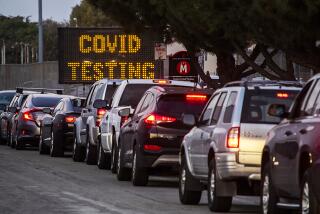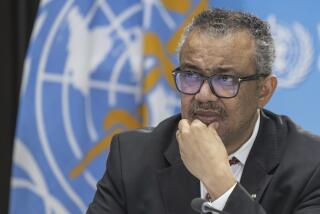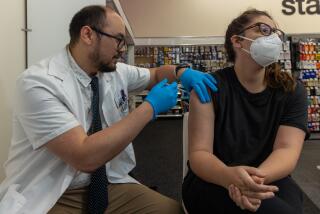WHO Warns of a SARS Recurrence Next Flu Season
- Share via
HONG KONG — Amid signs that the world’s first SARS outbreak may have run its course, a leading World Health Organization official warned Thursday that detecting any recurrence of the pneumonia-like disease next winter will pose an entirely new set of medical challenges.
Those stricken with severe acute respiratory syndrome initially carry an extremely low level of the virus, making an immediate diagnosis all but impossible, said the WHO’s senior communicable diseases specialist, David Heymann.
The diagnostic problem raises the prospect that medical authorities worldwide could be forced to isolate and treat those suffering from any number of similar viruses that come with the colder winter weather, he said at a news conference here.
He called any such treatment strategy “a massive undertaking.”
“We’re at a handicap because we don’t have a diagnostic test that can tell us on Day 1 that this is SARS,” Heymann said. “That’s what makes this a major challenge.
“I know that the Hong Kong Health Department is gearing up for that, as is every other country,” he added. “The U.S. is very concerned about this. They are making extreme plans.”
A few hours earlier, another WHO official told a conference in Singapore that the ability of the SARS virus to mutate has complicated efforts to develop a vaccine against the disease.
“The number of mutations is up,” said Marie-Paule Kieny, the head of the agency’s Initiative for Vaccine Research, according to Associated Press. “We have to monitor its diversity and its potential evolution.”
Medical researchers believe there is a high probability of an outbreak next winter because -- like other flu-like viruses -- the SARS virus probably prefers colder weather.
“It may be a seasonal virus, and it may come back,” Heymann told reporters.
His comments came as health authorities in Hong Kong and Beijing -- the two cities most seriously affected by the disease -- reported no new cases during the 24 hours ending Thursday morning. Beijing authorities also reported no deaths during that 24-hour period, although officials in Hong Kong said a 68-year-old woman with a history of chronic illness had died in Queen Elizabeth Hospital.
Despite that death, Heymann confirmed that Hong Kong is expected to be removed from the WHO’s list of SARS-affected areas Sunday, 20 days after the last known case of the disease in the territory was isolated. The 20-day period represents twice the incubation period for the disease.
That step would follow the recent lifting of a series of travel warnings and advisories that had brought normal life to a halt and devastated the economy of Hong Kong, which is a quasi-autonomous region of China. Cancellations of these warnings have brought new hope for a revival of business in the region.
On its Web site Thursday, the WHO listed a total of 8,462 SARS cases worldwide since the illness was first detected in China’s southern Guangdong province in November. More than 90% of those cases have been in mainland China, Hong Kong and Taiwan.
While Heymann underscored the difficulties of detecting any new SARS outbreak in its earliest stages, he said health authorities had learned that containing the disease needs no sophisticated tactics, only hard work.
“The best news is that it doesn’t require anything different than good, strong surveillance and a disease detection system; good, solid hospital infection control so the disease doesn’t spread to others; and contact tracing,” he said.






